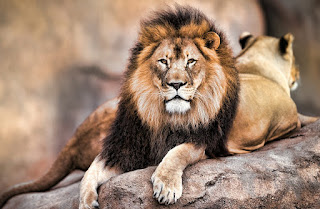The Cultural Significance of Lions in African Tribes
"The Cultural Significance of Lions in African Tribes"
In the heart of Africa's diverse landscapes, where traditions and stories are woven into the fabric of daily life, lions emerge as powerful symbols that transcend mere presence. Beyond their physical form, lions hold deep cultural significance within African tribes, embodying a tapestry of beliefs, values, and connections that stretch back through generations. This article embarks on a journey through the cultural landscape of African tribes, exploring the profound meanings attached to lions and the ways in which these majestic creatures shape the spiritual, social, and artistic expressions of indigenous communities.
Guardians of Power and Majesty
Lions, with their regal bearing and formidable presence, often symbolize qualities of power and majesty within African tribal cultures.
1. Leadership and Authority: Lions are often associated with leadership and authority. Chiefs and tribal leaders may be likened to lions, embodying qualities of strength and wisdom that guide their communities.
2. Courage and Bravery: Lions' bravery and fearlessness in the face of challenges resonate with qualities valued in many African tribes. Warriors and hunters draw inspiration from the lion's courage as they navigate life's trials.
3. Symbols of Protection: The lion's role as a protector is reflected in amulets, charms, and adornments worn by tribe members. These symbols are believed to ward off danger and ensure the safety of individuals and communities.
Ancestral Connections: Spirituality and Belief
Lions serve as conduits to the spiritual realm, forging a bridge between the physical and metaphysical worlds within African tribal beliefs.
1. Ancestral Spirits: Lions are often regarded as messengers of ancestral spirits. Their presence is believed to signal the guidance and protection of ancestors, enriching the spiritual connection between past and present.
2. Ritual and Ceremonial Significance: Lions feature prominently in rituals and ceremonies that mark important life events, such as initiations, weddings, and funerals. Their inclusion infuses these events with spiritual significance and reinforces cultural ties.
3. Connection to Deities: In some tribes, lions are associated with deities or revered beings. They are considered manifestations of divine forces, embodying both the sacred and the earthly.
Artistic Expressions: Lions as Inspirations
The cultural importance of lions is echoed in various forms of artistic expression, shaping the visual and narrative landscapes of African tribes.
1. Visual Representations: Lions are depicted in traditional art forms such as masks, sculptures, and paintings. These representations capture the essence of lions and serve as visual conduits to cultural narratives.
2. Oral Traditions: The lion's significance is woven into oral traditions—folktales, songs, and stories passed down through generations. These narratives perpetuate cultural values and transmit lessons from the past.
3. Symbolism in Adornments: Lions are often incorporated into adornments worn during ceremonies and celebrations. Beads, textiles, and body paint feature lion motifs that communicate identity, heritage, and pride.
Conservation and Cultural Heritage
The preservation of lion populations extends beyond ecological concerns; it is intertwined with safeguarding cultural heritage and tribal traditions.
1. Biodiversity and Identity: Lions contribute to the biodiversity of ecosystems, which in turn sustains the cultural diversity of African tribes. The presence of lions enriches the heritage of indigenous communities.
2. Ecotourism and Community Benefits: Lions draw ecotourism to tribal lands, creating economic opportunities for communities. Sustainable tourism promotes cultural exchanges and provides incentives for lion conservation.
3. Conservation Collaborations: Collaborative efforts between conservation organizations and tribal communities are essential. These partnerships respect cultural beliefs and engage tribes as stewards of their land and wildlife.
Conclusion: Lions as Living Legacies
Within the vibrant tapestry of African tribes, lions emerge as living legacies, embodying a rich blend of cultural meanings, spiritual connections, and artistic inspirations. They traverse the landscapes of tradition, weaving themselves into the narratives of identity and heritage.
As we explore the intricate interplay between lions and tribal cultures, we are reminded that the roar of a lion resounds not only through the savannas but also through the stories of generations past and the aspirations of generations yet to come. To conserve lions is to honor their role as cultural icons, guardians of a shared heritage, and ambassadors of unity between humans and the wild. In this delicate dance between tradition and conservation, the lion's majestic presence continues to shape the collective soul of African tribes and, by extension, the global tapestry of cultural diversity.

.jpg)


Comments
Post a Comment